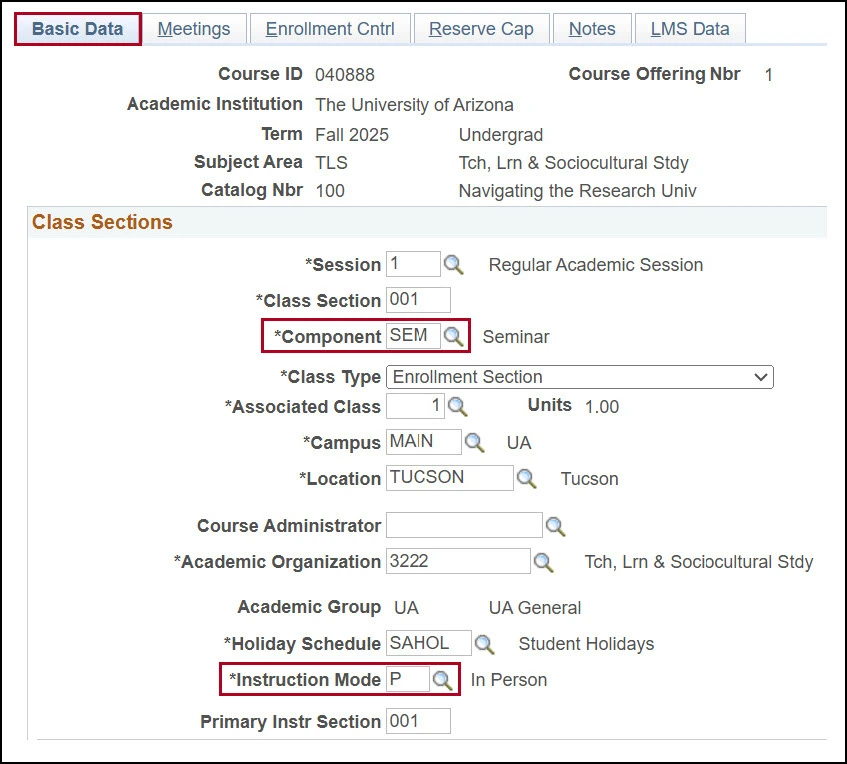about this guide
This guide lists the available course components and instruction modes that can be used when entering class information on the Basic Data tab.
component
Step 1: Course components (lecture plus lab or studio, workshop, and discussion) are defined at the catalog/course level through the course approval process and in alignment with the Course Types & Components policy. A course can have multiple components.
Step 2: A course with multiple components, requires additional sections to be created (lecture plus lab or studio, workshop, and discussion, etc.)
| U of A Course Component | U of A Definition |
|---|---|
| Lecture (LEC) | Standard course type. Lecture courses are led by the instructor and may include a variety of pedagogy types. |
| Discussion (DIS) | Interactional meeting typically serving as a secondary component that can include activities such as demonstrations, hands-on engagements, case studies, field experiences |
| Proseminar and Seminar (SEM) | The development and exchange of scholarly information, usually in a small group setting. The scope of work shall consist of research by course registrants, with the exchange of the results of such research through discussion, reports, and/or papers. |
| Colloquium (CLQ | The exchange of scholarly information and/or secondary research, usually in a small group setting. Instruction often includes lectures by several different persons. Research projects may or may not be required of course registrants. |
| Lab (LAB) | A course set aside for supervised laboratory or field experimentation, observation, or practice in a field of study or a course incorporating practical experience. |
| Workshop (WRK) | The practical application of theoretical learning within a small group setting and involving an exchange of ideas and practical methods, skills, and principles. |
| Studio (STD) | A course set aside for supervised creative and/or artistic endeavors incorporating practical experiences and possibly individualized instruction. |
| Individual Studies (IND) | Consists of course types including Preceptorship, Directed Research, Internship, Practicum, Independent Study, Research, Case Studies, Master's Report, Thesis, Master's Recitals, Dissertation, and Doctoral Recitals. |
| Practicum (PRA) | The practical application, on an individual basis, of previously studied theory and the collection of data for future theoretical interpretation. |
Note: When scheduling non-primary components for a course, update the default component to match the component permitted by the catalog rules. Components may be required as noted in the catalog or optional as noted in the catalog. All required components must be scheduled.
instruction mode
Note: When scheduling non-primary components for a course, update the default component to match the component permitted by the catalog rules. Components may be required as noted in the catalog or optional as noted in the catalog. All required components must be scheduled.
| Description | Code | Definition | Available Program Offering |
|---|---|---|---|
| Fully Online | FO | Instruction is offered asynchronously online without scheduled meeting dates or times. |
|
| Hybrid | HY | Instruction is offered through a combination of in person and online instruction modes. The online meeting pattern may be scheduled as synchronous or asynchronous and is reflected in the Schedule of Classes accordingly. |
|
| In Person | P | Instruction is offered in a physical class location and meeting pattern listed in the Schedule of Classes. |
|
| Live Online | R | Instruction is offered synchronously online with scheduled meeting dates and times. |
|
Note: It is recommended departments limit the number of Live Online classes, as in-person classes should be a higher priority to meet student demand. Offering undergraduate Live Online classes on Main Campus requires additional review and approval by the Associate Dean and the Registrar.
Related processes and additional resources
Open Scheduling period is the time when department schedulers complete class section set-up. Below are links to other resource guides that may be helpful to this process, and other class section set-up data entry.
More information on system updates can be found at RCS Reimagine: Updates to Managing the Schedule of Classes
Need Help? Contact Us!
For additional questions, you can reach the RCS team via email: rcshelp@arizona.edu or phone: 520-621-3313.
created 6/2025


